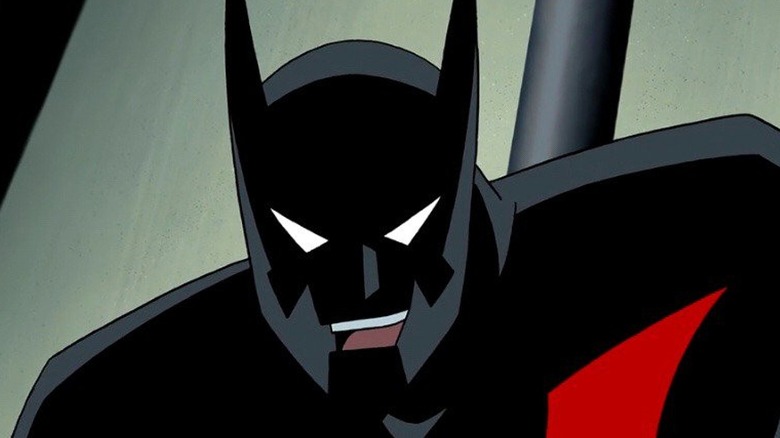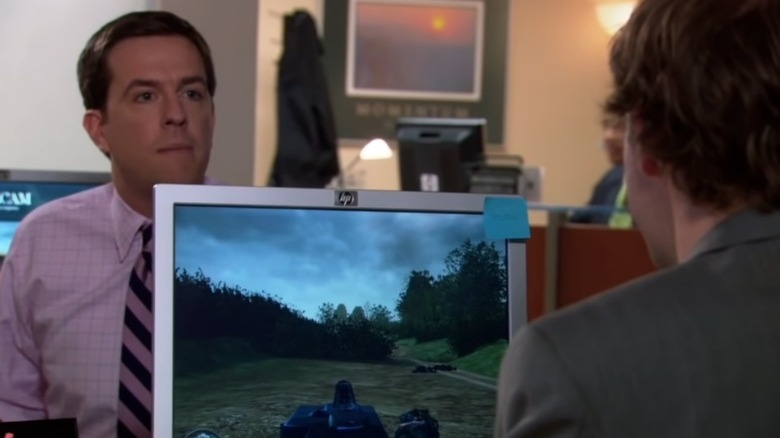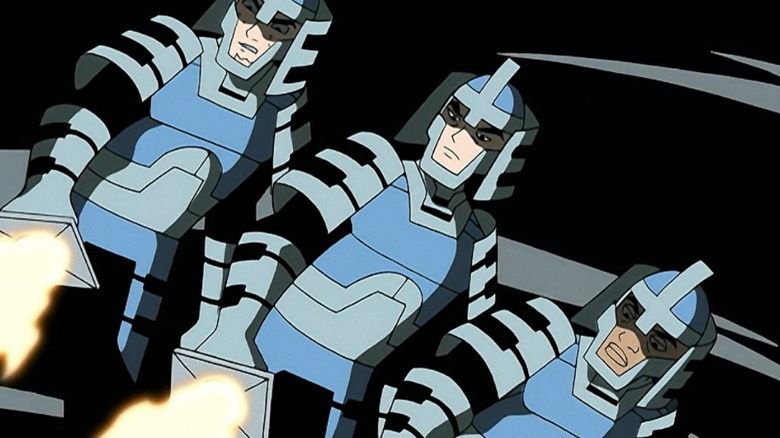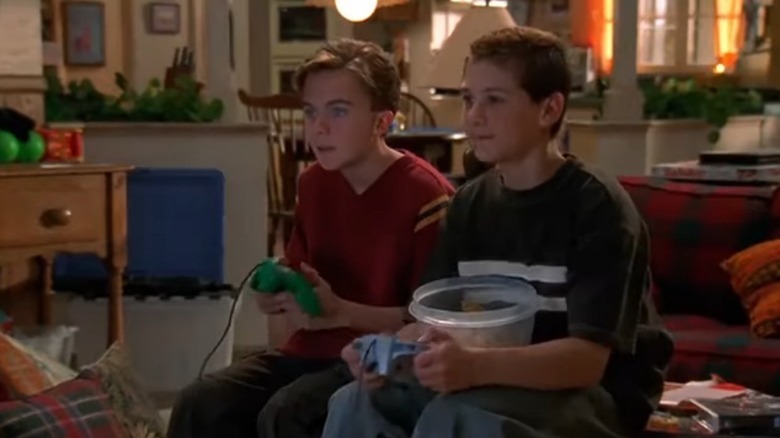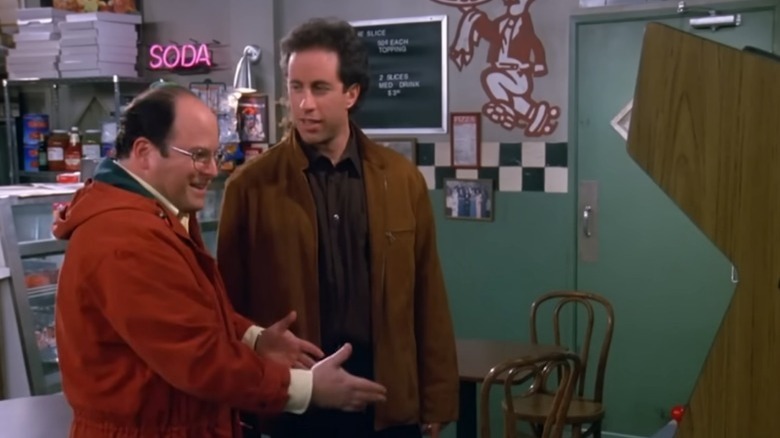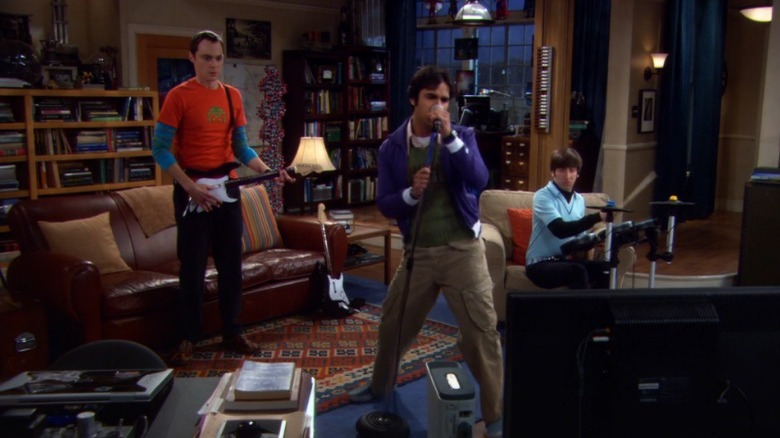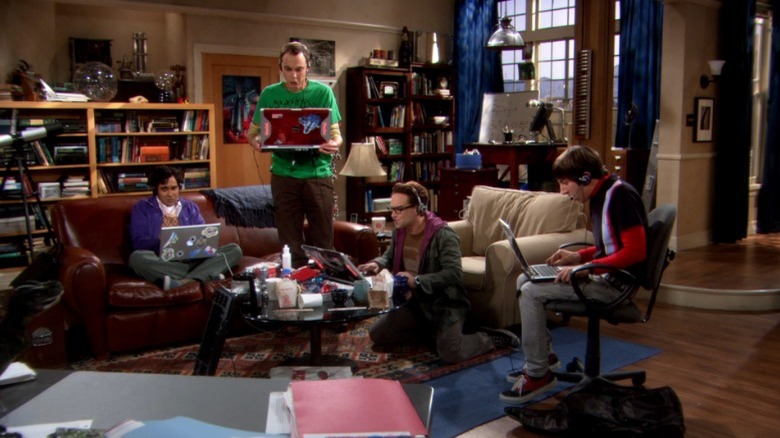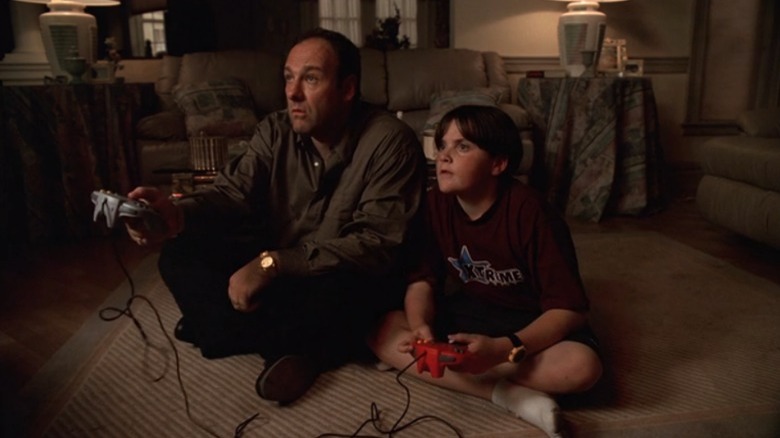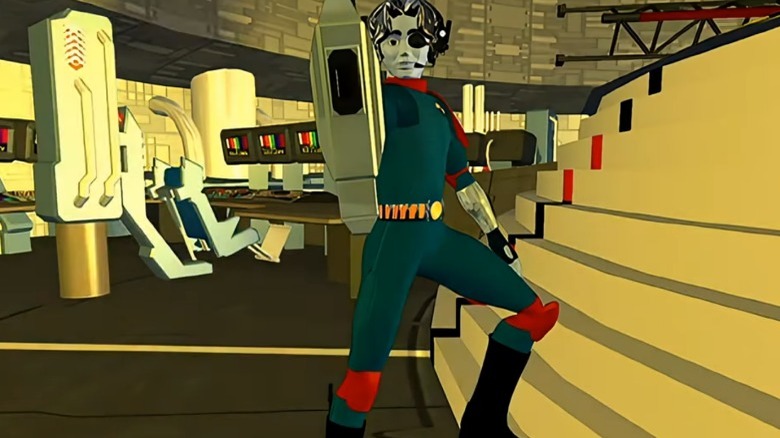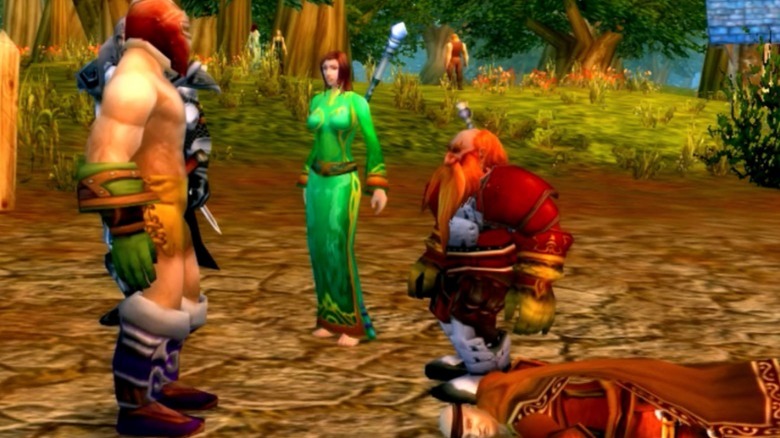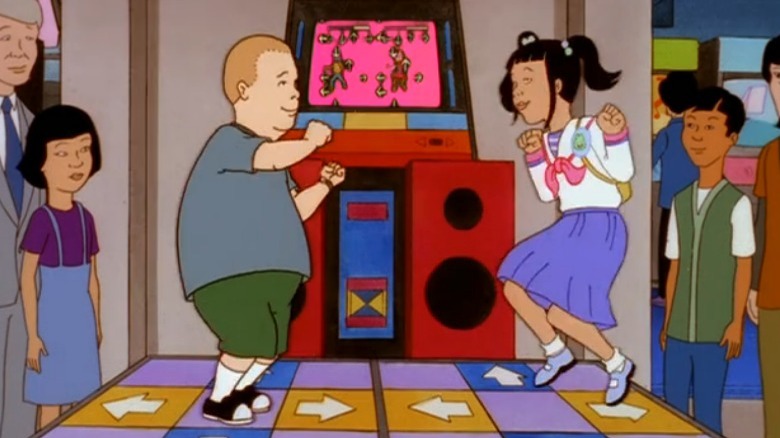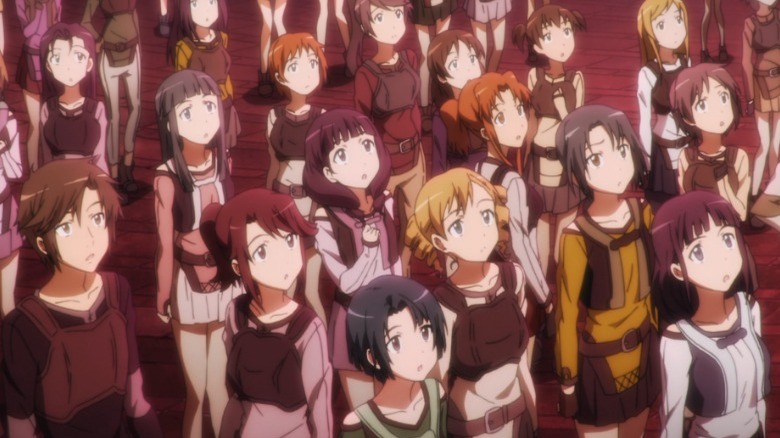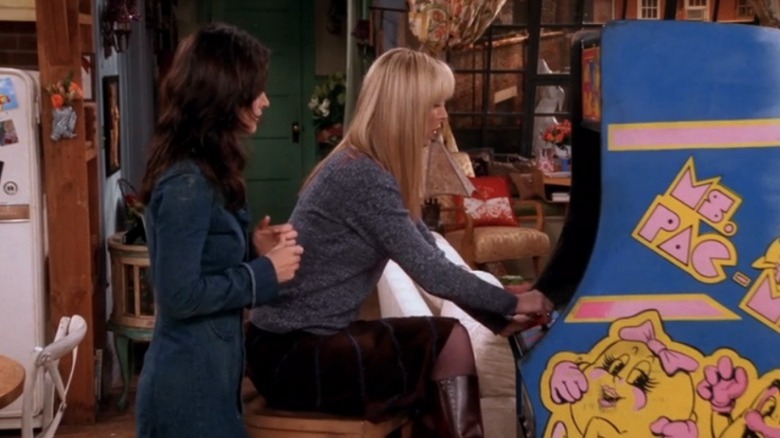TV Shows That Perfectly Summed Up Gaming
Mediums reference other mediums. TV shows appear in books; books show up in video games, and video games crop up in TV shows. Most often, these appearances are nothing more than set dressing; what game a character plays usually isn't as important as the fact they are playing a game. But sometimes, showrunners go the extra mile.
Every now and then, video games receive special attention in TV shows. Maybe the game is the focus of an episode, or maybe it is the catalyst for important character development or interactions. Either way, these segments usually give writers a chance to demonstrate that they thoroughly researched the subject. When video games take center stage in a show, they have to service the plot in a way any viewer can appreciate, but their inclusions can also make gamers say, "Yeah, I'm totally like this when I play games."
Here are some of the most noteworthy examples of TV shows that sum up video games and the gaming industry.
The Office
Team building activities are the most important part of many jobs. Companies can't hope to succeed, let alone thrive, if their employees don't know how to cooperate. The same can be said for video games, but just because someone is good at their job, doesn't mean they're good at video games.
"The Office" episode "The Coup" introduces audiences to the Stamford branch's favorite work-related activity: "Call of Duty." These sessions started as a team building exercise but blossomed into an office-wide pastime to keep spirits up. Everyone in the office plays the game and loves it, but one character, Jim Halpert, kinda sucks at the game. He constantly shoots his allies on the German team (insert your favorite "Are we the baddies?" joke here), uses a sniper rifle in close quarters, and so on. Jim's poor performance drags his team down and annoys the heck out of them.
Anyone who frequents multiplayer has at least one story of teaming up with someone who didn't know how to play. This inept player might have constantly killed their teammates, used the wrong skills or weapons for the situation, or given their enemies points. Not only does this general lack of knowledge and skill tick off players, it also tends to cost them matches — which angers them even more. It's almost a rite of passage to survive at least one aggravating match alongside your own Jim Halpert.
Batman Beyond
In the world of comics, criminals are a superstitious, cowardly lot. They plan and plot, but they always get caught. Also, video games apparently have a tendency to drive them batty.
Since "Batman Beyond" stars the young Terry McGinnis, the character partakes in all the activities the original Batman refused, including video games. One such game is "Sentries of the Last Cosmos," a fictional VR title that takes center stage in the episode of the same name. This episode revolves around three kids who have spent countless hours mastering the game's mechanics and delving into its lore, not unlike many gaming and theorist content creators on YouTube. But in "Batman Beyond," the game's "creator," Simon Harper, almost tricks these kids into killing an innocent man...who actually programmed the game.
Yep, the plot twist is Simon only produced and published the "Sentries of the Last Cosmos" game. The man he wants dead, Eldon Michaels, did all the actual work. Why did Harper try to kill Michaels? Money. Harper funded development but reneged on his promise to share revenue, so Michaels sued him. Now, real world publishers would never stoop to killing, let alone threatening to kill someone — except Bobby Kotick, who allegedly sent his assistant a death threat. Refusing to pay developers and disassociating them from their games, however, is commonplace. For instance, Nacon refused to pay Frogwares around $1 million in owed royalties for "The Sinking City" and claimed it owned the game's IP rights. Sounds a lot like what Simon Harper tried to pull, only his schemes eventually went way further.
Malcolm in the Middle
The writers of "Malcolm in the Middle" decided to use one episode's cold open to demonstrate the irony of violence in video games. The fifth episode of "Malcolm in the Middle" opens with brothers Malcolm and Reese playing a violent video game while Dewey happily watches. In stark contrast to their usual behavior, the boys are actually kind and courteous to each other, but as soon as their mother Lois walks in, she puts an end to the fun. She forces them to turn off the game because she thinks it is "too violent," and as soon as that happens, a switch is flipped in the boys' heads and they return to their default, dysfunctional selves.
The irony on display, of course, reflects the reality that violent video games do not cause violent behavior. Countless studies have failed to find any connection between the two. In fact, some studies even demonstrate that video games make audiences less violent, and yet countless people believe the opposite. Everyone reading this article probably either had a parent or knows a friend whose parent bought into what is essentially a moral panic with all the validity of "Reefer Madness."
Sure, parents shouldn't allow their young children to play games meant for older audiences (that's what the ESRB rating system is for, after all), but as a whole, violent video games don't promote violence.
Seinfeld
Every gamer started somewhere. Everyone has that one title they loved so much that they want to preserve those feelings. Such is the power of nostalgia.
In one episode of the final "Seinfeld" season, Jerry and George visit a pizza parlor they used to hang out at, and George realizes it still has the "Frogger" cabinet he played in high school. Better yet, his high score is still intact and unbeaten. Overcome with nostalgia, George decides to buy the cabinet so he can bask in his previous video game achievements. But when he realizes that in order to ship the arcade cabinet he has to unplug it, which will erase his score (thus defeating the purpose of actually shipping it), hijinks ensue — including a real-life game of "Frogger."
While few people have gone to the lengths George did, the desire to relive retro gaming moments is stronger than ever. But don't take our word for it; just look at the current market. People have been buying up retro games and consoles left, right, and center. Studios are remastering (and sometimes remaking) more and more cult-classic titles, while companies such as Arcade1Up have made bank producing reproduction cabinets of fan-favorite arcade games. Perhaps George would have been better off purchasing one of those recreations and then working his way up to a new high score.
The Big Bang Theory
"The Big Bang Theory" isn't just a show for geeks and nerds; it's a show starring and written by geeks and nerds, too. For instance, Dr. Amy Fowler, who is a neurobiologist in the show, is played by Mayim Bialik, who is a neuroscientist in real life. When she says something remotely scientific in the show, she isn't just blindly reciting from a script. That sort of attention to detail also extends to video games in "The Big Bang Theory."
Since the main characters (Sheldon Cooper, Leonard Hofstadter, Howard Wolowitz, and Raj Koothrappali) are all nerds, their favorite pastimes include video games, especially co-op ones such as "Rock Band." Audiences get to see them rock out in "The Maternal Capacitance," with Sheldon on the guitar, Howard on the drums, and Raj on the mic. They're not good, but they're having fun, and that's what's important. And the episode closes with Sheldon and Leonard's mother bonding over a rousing duet of "Any Way You Want It." Birds of a feather sing together.
Anyone who has played "Rock Band" or any other music-centric video game will probably tell you the experience is all about moment-to-moment fun. Most gamers who have tried "Rock Band" and similar titles have lost themselves in the zen of timing button presses to the rhythm and pouring their hearts into the lyrics. Is it embarrassing to watch? Yes. But is it fun when you're playing the game? Also yes. And that's the point, as demonstrated by "The Big Bang Theory."
The Big Bang Theory Part 2
Since the main characters of "The Big Bang Theory" are all-purpose nerds, they don't just like one genre of video game. They also enjoy comic book, sci-fi, and fantasy games.
Sheldon, Leonard, Howard, and Raj are a team in "real life," so it only makes sense for them to form one in video games, which is why "The Fuzzy Boots Corollary" opens with the gang engaging in a "World of Warcraft" raid. They cooperate pretty flawlessly, at least until Sheldon loots the Sword of Azeroth (which isn't a real in-game weapon, FYI). He then abandons his friends and sells the item on eBay. Anyone who has played an MMO can sympathize with Leonard, Howard, and Raj at this point. We've all raided with real-life friends for fame and fortune (and loot). We've also dealt with annoying randos who roll "need" on everything, including equipment they can't use, but they want so they can sell their ill-gotten gains in auction houses.
And of course, Sheldon and the gang aren't the only gamers in "The Big Bang Theory." His neighbor Penny also occasionally plays some throughout the series, specifically in "The Barbarian Sublimation." In that episode, she takes an interest in "Age of Conan." Unfortunately, she becomes obsessed with the game so she doesn't have to deal with reality and what she considers her failure of a life. Obsessively playing games as a form of escapism, while not healthy, is fairly common. Why else would countless studies have been written on the matter?
The Sopranos
Most parents will tell you the best way to bond with your child is to do something they like. If your kid likes video games, play some video games with them. Even mobsters know this.
At the start of the fourth episode of "The Sopranos," "Meadowlands," Tony Soprano comes home late to see his son A.J. playing "Mario Kart 64" on a school night. But instead of coming down on A.J. and forcing him to go to bed, Tony instead joins him. Sure, Tony doesn't know how to play at first, but he quickly learns. Plus, he engages in some unorthodox tactics reserved for family members (i.e., playful roughhousing) and makes small talk with A.J. And at the end, Tony uses the experience to teach A.J. a lesson: "Focus through distractions."
Tony's short gaming session with A.J. is a textbook example of how parents can bond with their children over video games. Just play whatever they're playing — especially if it's multiplayer — learn the ropes, and use it to springboard into small talk and other conversations. Also, countless gamers young and old have stayed up way later than they should have to play a game. If video games weren't so fun, that temptation wouldn't exist.
ReBoot
"ReBoot" is arguably one of the most important cartoons of the 90s, even if you didn't realize it. Not only did the show demonstrate the power of computer-generated animation, it even predated "Toy Story" by a year. Quite fittingly, "ReBoot" revolved around anthropomorphized computer programs defending their home from viruses and wild video game scenarios. While most of these games reference popular media, such as "The Evil Dead" and "Mad Max," others reference specific aspects of games.
The episode "The TIFF" mostly deals with a falling out between protagonists Dot Matrix and Bob. Dot's young brother Enzo tries to help mend their relationship, but he only makes things worse right before Dot and Bob are trapped in a game. In standard "ReBoot" fashion, the only way to escape is to beat the game and its player. Dot wants to be strategic, but Bob wants to treat the experience like a run-and-gun shooter. Eventually, circumstances demand they adopt each others' plans while talking each other through their new roles.
Bob and Dot's adventure reflect countless multiplayer gaming sessions. No two players have the exact same strategies. When a player has to adopt new tactics on the fly, they typically need a coaching crash course, which usually consists of other players talking them through the basics because there's not enough time for anything more in-depth. Granted, Bob and Dot went through their ordeal for the sake of the plot, but it still played out like pretty much every multiplayer co-op match ever.
South Park
"South Park" is the arguable prince of parodies. If the showrunners can make fun of something, video games included, they will. During the peak of"World of Warcraft" popularity, Matt Stone and Trey Parker teamed up with Blizzard to create one of the series' best episodes.
The story of the episode "Make Love, Not Warcraft" is legendary. Stan, Kyle, Cartman, and Kenny are ganked by a PvP-happy player who breaks the rules of "World of Warcraft" and kills them, even though the boys didn't agree to a duel. And they're not the only victims, as this PvP player targets the entire server. Instead of doing the rational thing and jumping onto another server (or making Horde characters), the South Park boys painstakingly level up their characters to take on the ganker and get back to playing "WoW" uninterrupted.
While the episode is intentionally overblown and mocks MMO tropes, it was made with love for the game and holds a kernel of truth. In order to take down the main villain, Stan, Kyle, Cartman, and Kenny grind for countless hours and use MMO tactics to prioritize targets and abilities. The antagonist might not be a raid boss, but the boys use the same strategies required for beating them. And once they finally win, what do Stan, Kyle, Kenny, and Cartman do? Go right back to grinding in order to tackle the next challenge. That's the MMO experience in a nutshell.
King of the Hill
"King of the Hill" is one of the greatest adult-oriented cartoons of this or any generation. Instead of being an episodic comedy like similar shows, "King of the Hill" is an outright sitcom that focuses on drama, minor arcs, and characters learning lessons. Many episodes revolve around protagonist Hank Hill disagreeing with his son Bobby on certain ideas. Video games aren't one of them. Usually.
Every now and then, video games pop up in "King of the Hill," but they usually aren't the focus. For instance, the episode "It Ain't Over 'Til the Fat Neighbor Sings" revolves around Hank's neighbor, Bill Dauterive, getting overly involved in an all-male chorus — but the episode also introduces audiences to Peggy Hill's old "Pong" console. In "Returning Japanese," the Hill family visits Japan and meets Hank's long-lost half-brother. During their stay, Bobby takes up "Dance Dance Revolution" and plays with a girl who loves it too.
Since these episodes are often too busy telling their own stories, video games are shown in a more positive light for what little time they have. Peggy's "Pong" machine lets her and Bobby bond over a shared love of gaming, even if Bobby is initially displeased by the game's lack of guns and zombies. After all, plenty of kids in the real world are disappointed that retro consoles lack the features of modern platforms. As for the "DDR" portion...it's "DDR." Virtually every show that references it accurately portrays how fun the game is and how impressive it can be to watch someone who's good at it, "King of the Hill" included.
King of the Hill Part 2
When "King of the Hill" does put gaming in the crosshairs, though, it typically focuses squarely on the negative aspects... when a non-gamer like Hank Hill goes in too deep too fast, that is.
The episode "Grand Theft Arlen," as you can probably tell by the title, centers around a "GTA"-like game called "Pro-Pain!" Initially, Hank only plays the game for research purposes, because his boss wants to sue the creators for copyright infringement. But when Hank learns the game has a "Manager Mode," he becomes addicted due to his dreams of becoming a manager at Strickland Propane. Hank only stops playing after Peggy beats him in multiplayer mode. And because she asked the developers to delete the game server.
As previously stated, the title "Grand Theft Arlen" satirizes "GTA," and the rest of the episode does as well. But what good is satire without some truth behind the ridicule? Stories about people becoming addicted to video games are common, but that only scratches the surface of "Grand Theft Arlen." The game's title, "Pro-Pain!," is an example of the intentionally poor literacy occasionally used in game titles to make them more appealing ("Mortal Kombat" is another one).
And as Hank Hill points out in the episode, gas tanks and cars don't explode when you hit them. Name a video game in a contemporary setting that doesn't get that fact wrong. You probably can't.
Sword Art Online
You may be wondering: How on earth does this show sum up gaming? Some fans view "Sword Art Online" as a hybrid power fantasy/harem anime. Sure, in later episodes, the main character becomes OP as heck — but before the show devolves into that cliche, it does a decent job at representing MMO tropes.
The first few episodes of "Sword Art Online" set up the basic premise, namely that everyone is trapped in a VR game, and the only way out is to beat the final boss. Oh, and if you die in the game, you die in real life. Thus begins the mad dash to the finish consisting of desperate raids that mostly end in failure. These sequences are bit heavy on cliches, but not without moments that speak to gamers.
In the first episode, to add insult to injury, every character is forced to look like their real selves. While some barely change, others transform so radically they change ages and height. Every gamer has used a character creator to build their ideal avatar at least once, and they typically look pretty different from real life. And in the second episode, when trying to make their way through a dungeon, characters spout out instructions, Every seasoned MMO player will tell you voice chat and proper tactics are the key to successful dungeon raids.
Friends
Why do people buy games for their friends? Do they think their friends will love the gifts, or do they perhaps want to play the games for themselves? Sometimes the line between the two can be blurred.
In one of the many side-plots of the "Friends" episode "The One Where Joey Dates Rachel," Phoebe buys Chandler and Monica a "Ms. Pac-Man" arcade cabinet. Phoebe seems a little too excited to hand over this gift, probably because she ends up playing it more than both of them at first. Then, because Monica loved playing "Ms. Pac-Man" as a kid, she is also better at the game than Chandler, so to keep up, he stays home all day practicing. The good news is this strategy works; the bad news is his hand cramps up as a result.
Odds are most gamers have first-hand experience with at least one of the problems brought on by Monica and Chandler's new arcade cabinet. It's not uncommon for a gamer (or anyone else for that matter) to receive a gift from someone who ends up using it more than they do. As for Chandler, he is just one of many people who played games so much they injured themselves. Granted, his claw hand is a joke within the episode, but real-world injuries brought on by obsessive gaming are no laughing matter.
Oh and before we forget: Later in the episode, Chandler and Monica attempt to coach Phoebe during a "Ms. Pac-Man" session by telling her which way to go. Who among us isn't guilty of an occasional bit of back-seat gaming?

